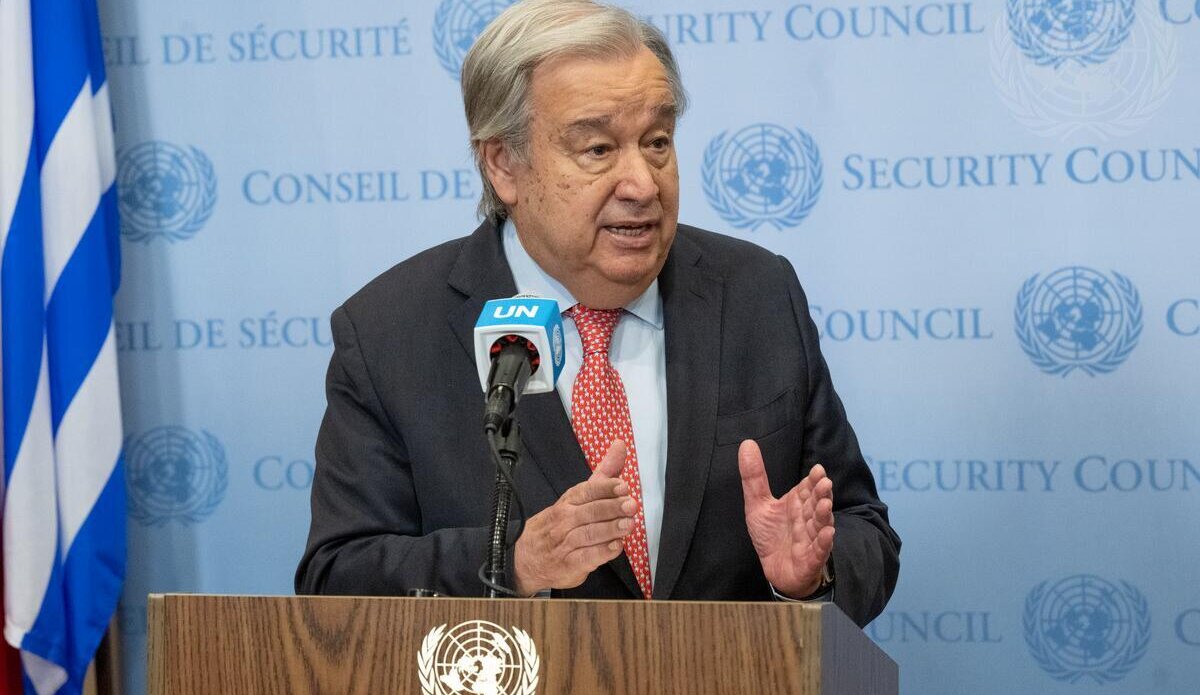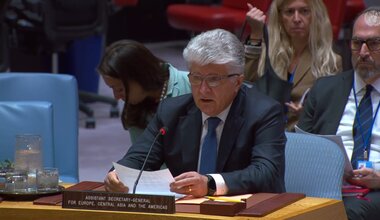The Final Agreement remains a valid roadmap to consolidate peace in Colombia
Removing violence from politics and promoting inclusive political participation are central objectives of the Peace Agreement
Bogotá, 14 July 2025. In his most recent report on the United Nations Verification Mission in Colombia, covering the period from 27 March to 26 June 2025, United Nations Secretary-General, António Guterres, stressed that the 2016 Peace Agreement continues to be a valid roadmap for consolidating peace in Colombia: “That critical problems continue to limit the dividends of peace in regions still affected by conflict, is a call for redoubled efforts to implement the Final Agreement, particularly the provisions that are long-term in nature and that aim to overcome the structural factors that have fueled the conflict.”
For the Secretary-General, Colombians continue to work with great determination to establish lasting peace after decades of armed conflict, and their efforts deserve the continued strong support of the international community. Noting that there is just over a year remaining in the term of the current administration, he stated that “this time should be fully used to drive implementation forward.”
The Secretary-General mentioned that the forthcoming elections may contribute to exacerbate political divisions, but he trusts that the work for peace will continue to move forward in a spirit of cooperation across the political spectrum. “I welcome that Colombian leaders from all parties have joined in strongly condemning recent political violence. Removing violence from politics and promoting inclusive political participation are central objectives of the Final Agreement,” he stressed.
António Guterres expressed deep concern about the persistent violence affecting civilians in various regions of Colombia. He stressed that Indigenous and Afro-Colombian communities, including children recruited by armed groups, former combatants, and social leaders, have been especially affected. “I call upon the armed groups to cease all threats and violence against civilians. And I urge the State, in its entirety, to take appropriate action to strengthen security, combat illegal economies, uphold justice and protect all affected communities,” he insisted.
During the reporting period, ten former members of the FARC-EP were killed, bringing to 470 the number of peace signatories killed since the signing of the Peace Agreement. Regarding the situation of social leaders and human rights defenders, the United Nations Office of the High Commissioner for Human Rights (UN Human Rights) recorded 34 allegations of homicide against human rights defenders, compared with 40 allegations during the previous reporting period. The UN Human Rights received 13 allegations of massacres during the reporting period, a decrease compared with the 22 allegations in the previous quarter. The cumulative figures for the semester show a decrease, compared with 41 in the last semester of 2024.
In this context, the Government established the Comprehensive Protection Programme for former combatants by decree. It included the formalization of the Tripartite Protection and Security Mechanism (ITPS)—aimed at preventing or resolving security-related challenges—bringing together representatives of the State, of former combatants and of the Verification Mission.
With regard to internal displacement, between January and 19 June 2025, the United Nations Office for the Coordination of Humanitarian Affairs (OCHA) recorded a total of 67,800 victims of mass forced displacement, due especially to the events in Catatumbo in January, representing a 107% increase compared to the same period in 2024; and 98,700 victims of confinement (5% increase).
In terms of reintegration, the report highlights important progress. Ninety-five per cent of the 11,166 former combatants active in the reintegration process have completed their individual reintegration plans. Around 30 per cent of these plans include capacity-building on political reintegration, showing that former combatants continued to prioritize political participation as a key avenue for contributing to peacebuilding and democracy. The report also notes the formal installation of the National Reintegration System, which coordinates over 30 entities with responsibilities under the reintegration process.
Regarding the comprehensive rural reform, the report notes the continued efforts of the Government to facilitate the adjudication and formalization of land for peasants, rural women, and victims. However, financial constraints and security risks for civil servants on the ground limited the pace and scale. According to the Ministry of Agriculture, around 40,000 hectares were adjudicated during the reporting period, bringing the overall total to 7 per cent of the 3-million-hectare goal set in the Agreement. Furthermore, 86,000 hectares were formalized during the reporting period, bringing the overall total to 47 per cent of the 7-million-hectare target set in the Final Agreement.
The Secretary-General highlighted that the forthcoming restorative sentences of the Special Jurisdiction for Peace (SJP) represent novel means to impart justice in the context of a transition from conflict to peace and noted that it is essential to expedite the preparations for their implementation. “I trust that all actors involved will continue to play their part, demonstrating flexibility and innovation, and ensuring the necessary resources to turn these sentences into restorative actions that serve the victims and help foster reconciliation. I urge the individuals appearing before the SJP to continue to uphold their commitments to peace and fulfil their obligations before justice, victims and Colombian society at large,” he noted.
Furthermore, following negotiations with Indigenous organizations, the Government issued decrees and guidelines to operationalize their autonomy—an achievement long-awaited since this was formally enshrined in the 1991 Constitution. The decrees and guidelines facilitate the implementation of the Ethnic Chapter, allowing the involvement of Indigenous authorities in matters such as the multipurpose cadastre and the special Indigenous jurisdiction.
Regarding the National Action Plan on Security Council Resolution 1325 on women, peace and security, the decree officially adopting the plan is yet to be issued. However, it should be noted that the interinstitutional group has approved its internal regulations, a work plan, and a strategic plan.
Noting that, together with a sound security strategy, dialogue is key to achieve peace in Colombia, António Guterres stressed that it needs to be pursued with those armed actors that demonstrate the necessary commitment and should be focused on the well-being of local populations as well as on achieving tangible results.
Finally, the Secretary-General highlighted that international support remains vital to this Colombian-led peace process. He also acknowledged that the mandate and presence on the ground of the Verification Mission helps to foster trust between former adversaries, to underscore persisting challenges and assist in finding solutions.
The report will be presented in New York on 18 July by Mr. Carlos Ruiz Massieu, Special Representative of the Secretary-General and Head of the United Nations Verification Mission in Colombia.
***
 UN
UN





